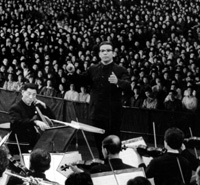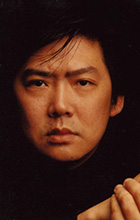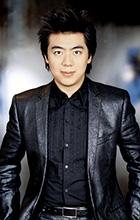Watch a Video
Conductor Long Yu on the importance of Chinese orchestras.
Interviews with Lang Lang and Long Yu © 2009 The Carnegie Hall Corporation. Footage of China from the film “Broken Silence” (Directed by Eline Flipse); Footage of Isaac Stern and Beijing Conservatory from the film “From Mao to Mozart” (Dir. Murray Lerner) courtesy of Murray Lerner Films.
Listen
More Audio
Related Essays
Shanghai Symphony Orchestra

To trace the rise of Western music in China, one need only examine the 130-year history of the Shanghai Symphony Orchestra. At the time of its founding in 1879, the Shanghai Public Band, as it was initially known, had no Chinese members or audiences. Established by the Municipal Council—the governing body of Shanghai’s International Settlement—the band comprised about 20 Filipino musicians and a French conductor. By the end of the Qing Dynasty in 1911, membership had grown to 35, including several European musicians.
World War I took its toll on Shanghai’s musical life, as the Europeans returned home to perform military service. Germans were eventually expelled from the city entirely. The band had no leader for three years until the arrival of the Italian pianist and conductor Mario Paci in 1919. Within three years, Paci had expanded the ensemble, now renamed the Shanghai Municipal Symphony Orchestra. Under Paci’s insistence, Chinese were allowed to attend performances and, more significantly, to perform in the ranks. By the end of the 1920s, the orchestra had become the city’s chief cultural asset, attracting such star soloists as Fritz Kreisler and Jascha Heifetz.
Under the Japanese occupation (which extended to the International Settlement in 1941), the orchestra was renamed the Shanghai Philharmonic Orchestra and placed under private patronage. Paci was soon replaced by Arrigo Foa, formerly the orchestra’s concertmaster, who continued off and on as principal conductor for the next seven years.
By 1949, with the establishment of the People’s Republic of China, the orchestra changed its name to the Shanghai People’s Municipal Symphony Orchestra and, later, the People’s Symphony Orchestra of Shanghai. In 1951, the orchestra employed its first Chinese conductor, Huang Yijun, formerly a trumpet player with the orchestra.
Initially under Huang, the 56-member orchestra still employed more than a dozen foreign musicians, most of whom were Russians. In 1953, the ensemble was renamed the Shanghai Symphony Orchestra, and within five years its ranks were made up entirely of Chinese citizens. The orchestra upheld its mission of promoting international cultural exchange through state performances and international tours.
During the Cultural Revolution (1966–1976), Huang was removed, and many of the orchestra’s musicians dispersed to play in song-and-dance troupes. Under Huang’s replacement, Cao Peng, concerts were reduced to a minimum, mostly in factories and the countryside. Once the turmoil had ended, Huang returned to the podium to rebuild the orchestra, remaining until 1984.
First appointed principal conductor in 1984, Chen Xieyang became music director two years later, the first time that a musician rather than a Communist Party secretary was in charge of artistic and business decisions. Under Chen’s 25-year reign, the orchestra has served as a distinguished musical ambassador both at home and abroad as well as on recordings, including the Oscar- and Grammy-winning soundtrack to Crouching Tiger, Hidden Dragon.
The orchestra’s current Music Director is Long Yu, who begins his inaugural season in fall 2009.
Visit the Shanghai Symphony Orchestra online ![]()
Focus On: Chen Qigang
As an elder member of the Class of 1978, Chen Qigang was also the first of his class to leave China after the Cultural Revolution. Well before his colleagues at Beijing’s Central Conservatory—Tan Dun, Chen Yi, and Zhou Long—relocated to the US, Chen became the first Chinese composer to be awarded a state grant to study in France. Initially the allure of the opportunity was strictly musical. “The detail and nuance in French music was very similar to my own,” admits Chen, the son of an established Shanghai literati family whose father had been the head of the Beijing Academy of Fine Arts. “I had already discovered Debussy and Ravel on my own. But then I met Messiaen.”
Olivier Messiaen, with whom Chen studied from 1984 to 1988, had a significant influence on the younger composer. “In China, you learn to be sociable, subservient to everyone. If necessary, you must be entirely at the disposal of society,” says Chen, who put that traditional philosophy in practice in 2008 as the music director for the Olympic Opening Ceremony in Beijing. “Messiaen was the first person to tell me you have to be true to yourself. This is fundamental for an artist, but few of us are brave enough to face the truth. It took me many years to discover who I really am.”
In His Own Words
On the Cultural Revolution:
“My father and mother were sent to a labor camp where people from many institutions were interned. I couldn’t visit them for several months. At my music school, there was a lot of violence as well. Many old people were arrested, accused of being large landowners, and beaten to death by students. Some students participated because they came from ‘counter-revolutionary’ families and wanted to prove that they were revolutionary. By 1970 my entire school was sent to barracks south of Beijing for ‘re-education.’ One of my friends, a piano student, completely lost her mind. A teacher also went crazy. One student tried to commit suicide. There was a lot of pressure. I learned a lot from these times. Those who survived can cope with life much better than they could before.”
On writing “Chinese” music:
“In China they always talk about our ‘national style.’ They claim our culture has a longer and more interesting history and is much stronger than Western culture. Yet we have no ‘style.’ That is the paradox …”
“In the West, I have the feeling that they put [us] into a group because we’re exotic. From an artistic point of view, we’re not part of the same group. Aesthetically, we are sometimes complete opposites.”
Program Notes
IN THE ARTIST’S OWN WORDS: Long Yu
It is with great pleasure that I have the opportunity to conduct the Shanghai Symphony Orchestra at the closing concert of Ancient Paths, Modern Voices at Carnegie Hall, along with pianist Lang Lang, as well as many excellent Chinese instrumentalists and vocalists. This marks the second time that the Shanghai Symphony Orchestra, with a history of 130 years, performs at this splendid landmark.
Music has always been regarded as a universal language, with musicians being the messengers of friendship and love. One of my most satisfying contributions has been bringing Eastern and Western cultures closer together through this beautiful language. I hope that under my direction this concert will serve as a chance for audiences to not only enjoy a performance by Chinese musicians, but also to experience Chinese contemporary music. Personally, I think that contemporary music—especially Chinese contemporary music—has been of great importance throughout my career. Each time I am on a podium conducting Chen Qigang’s Iris dévoilée—regardless of whether the orchestra is Chinese, American, or European—I am reminded of its artistry as a contemporary masterpiece. I hope this work will delight New York audiences as well, and that it will provoke greater interest in Chinese music.
I look forward to taking the Carnegie Hall audience on this journey—or as Ralph Waldo Emerson said in The American Scholar, to "run eagerly into this resounding tumult."
THE PROGRAM
SERGEI RACHMANINOFF (1873–1943)
Piano Concerto No. 2 in C Minor, Op. 18
About the Composer
Few musical careers started so hopefully, or stalled so suddenly, as that of Sergei Rachmaninoff. An extraordinary youthful prodigy, Rachmaninoff entered the Saint Petersburg Conservatory at age nine and wrote his first orchestral composition when he was 14. By the time he was 20, he had completed a piano concerto; an opera, Aleko, which was triumphantly produced at the Bolshoi Theatre; several tone poems and chamber pieces; and a number of keyboard works, including the famous Prelude in C-sharp Minor. The stage seemed set for a lifetime of rich musical accomplishment.
Perhaps the brilliance of Rachmaninoff’s early career made the effect of his initial public failure the devastating event it proved to be. In 1897, his First Symphony failed dismally at its debut performance in Saint Petersburg. César Cui, a respected composer and critic, likened it to the product of "a conservatory in Hell." Other commentators were scarcely more kind.
Crushed by this reception, Rachmaninoff fell into an immobilizing depression. He eventually managed to secure a conducting post and performed a few piano recitals. But though committing to write a new piano concerto for a concert tour of England, he composed nothing during the next three years and became so despondent that friends worried for his health.
About the Work
Finally in 1900 Rachmaninoff was persuaded to visit Nicolai Dahl, a doctor specializing in treatment by hypnosis. In his memoirs, the composer recalled the treatment this way: "Day after day I heard the same hypnotic formula while I lay half asleep in Dahl’s armchair: ‘You will begin to write your concerto. You will work with great ease. The music will be excellent.’ Incredible as it may sound, this cure really helped me."
Dahl’s work must be counted the greatest psychiatric success in the history of music. In a short time, Rachmaninoff was again composing, completing his long-delayed Second Piano Concerto. This work was enthusiastically received when the composer performed it in Moscow, in 1901, and he dedicated the score gratefully to Dr. Dahl.
Although the Second Piano Concerto was only the first of a steady stream of works the quite fully cured Rachmaninoff brought forth in the early years of the last century, it has proved among the most popular. With the exception of only the famous Prelude in C-sharp Minor, it became the most frequently performed of his compositions and the principal agent of his fame during his lifetime. It remains a perennial favorite of both pianists and audiences. It is a supremely melodious work, so much so that several of its themes have been used for popular songs. (The concerto itself has served as the soundtrack to several motion pictures.)
A Closer Listen
The first of Rachmaninoff’s captivating melodies is heard in the strings following a brief introduction of pensive chords in the piano. The soulful Russian character of this initial subject is contrasted and complemented by a tender second theme, set forth by the solo instrument.
The ensuing Adagio opens on a note of almost religious tranquility, after which the piano provides delicate accompaniment to a dream-like melody in the flute and clarinet. Toward the end of the movement, there is a flurry of keyboard activity, culminating in a brief cadenza for the soloist, but the music soon returns to the gentle reverie of the opening.
A march-like introduction in the orchestra and glistening figuration in the piano precede the statement of the first theme of the finale, a subject in the spirit of the Scherzo from Mendelssohn’s music for A Midsummer Night’s Dream. But Rachmaninoff has saved his trump card, a sensuous melody stated by the orchestra. This theme, which in the 1940s became familiar to millions as the hit song "Full Moon and Empty Arms," returns after an extensive development of the first subject to bring the concerto to an ecstatic close.
Performance Time: approximately 33 minutes
CHEN QIGANG (b. 1951)
Iris dévoilée (Iris unveiled)
About the Composer
Since the end of the Cultural Revolution of the late 1960s and early ‘70s, and the subsequent opening of modern China to international commerce and artistic exchange, a number of Chinese composers have emigrated to the West and achieved notable results as creators of concert music. Some of these composers, such as Tan Dun and Bright Sheng, are known to American concert audiences. Others, especially those who have settled and worked primarily in Europe, are less familiar. Among the latter is Chen Qigang, whose Iris dévoilée forms the second half of this evening’s program.
Chen Qigang was born in Shanghai and subsequently lived in Beijing, where he undertook preliminary studies at the Central Conservatory of Music. Like Tan Dun and Bright Sheng, he experienced the effects of the Cultural Revolution first hand and at the cost of the interruption of his studies. The son of a respected artist and administrator of Beijing’s Academy of Fine Arts, he came from the type of family denounced as "bourgeois" during the radical upheavals that wracked China during the final phase of Mao Zedong’s rule. Chen Qigang was isolated for three years, during which time he underwent "ideological re-education." Not until 1977, when the Central Conservatory reopened in Beijing, did he resume the formal studies he had begun during his adolescence.
In 1984, Chen Qigang moved to France, where he studied with Olivier Messiaen. He subsequently worked at IRCAM, the famed institute founded by Pierre Boulez for exploring and developing new musical resources. His career has since flourished, as indicated by the numerous awards and commissions that he has earned.
A Fusion of East and West
While remaining based in France, Chen Qigang has maintained ties to his homeland, which has honored him with retrospective concerts and a commission to write the theme song for the Opening Ceremonies of the Beijing Olympic Games. Chinese orchestras and conductors have actively championed his work. Chen Qigang has explored the possibilities of combining Chinese and Western musical practice and traditions. A number of his works use Chinese instruments or make reference to stylistic traits of traditional Chinese musical idioms; Iris dévoilée does both.
About the Work
Iris dévoilée is a musical portrait—not of a particular woman, but of woman in a universal sense, as a female archetype. Iris is Goethe’s ewig-Weibliche, the "eternal feminine," and the unveiling referred to in the composition’s title is tantamount to her being discovered or revealed. The nine movements of Iris dévoilée, as Chen Qigang explains, portray "nine aspects, nine frames of mind, nine facets of the same woman—changeable, elusive." They form a "mosaic of impressions and tempers, appearances and natures" that aims "to express her unfathomable richness."
That multiplicity of attributes finds reflection in the use of three soprano voices whose singing derives alternately from Chinese and Western practice. One voice delivers texts in the language and style of traditional Peking opera. The others sing wordless vocal lines. The three sopranos have a counterpart in a trio of Chinese instruments—pipa, erhu, and zheng—which augment the Western-style orchestra.
The different aspects of Iris engender a variety of musical expression, ranging from exquisite delicacy to pulsating rhythms, from sensuous languor of a kind occasionally employed by Messiaen to sonic vehemence reminiscent of Stravinsky’s The Rite of Spring. Throughout the composition there is an opulence of color and texture unlike anything found in most modern music.
—Paul Schiavo
© 2009 The Carnegie Hall Corporation




 This performance is sponsored by Agricultural Bank of China.
This performance is sponsored by Agricultural Bank of China.